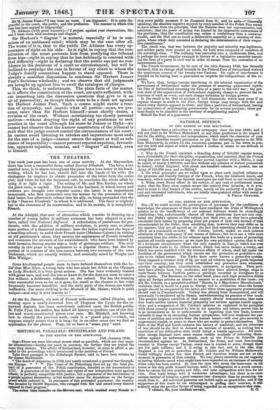HISTORICAL PARALLELS: SWITZERLAND AND POLAND. TO THE EDITOR OF THE
SPECTATOR. • 24th January 1848.
Sur—There are some historical events cited as parallels, which are very angu- lar illustrations—having one .point in common, the further they are traced the more they deviate. The affairs of Switzerland, however, do seem to afford a pa- rallel to the proceedings which terminated in the partition of Poland. Take these passages in the Edinburgh Review, said to have been written by Sir James Mackintosh.
" The death of Augustus, in 1733, had nearly occasioned a general war through.
out Europe. * • The Court of St. Petersburg then set up the fatal pre- text' of a guarantee of the Polish constitution, founded on the transactions of 1717. A guarantee of the territories and rights of one independent state against others, is perfectly compatible with justice; but a guarantee of the institutions of a people against themselves, is but another name for dependence on the foreign Power which enforces it. In pursuance of this pretended guarantee, the country was invaded by 60,000 Russians, who ravaged with fire and sword every district opposed to their progress." The writer then remarks on the ii7servin veto, which enabled every Nuncio to stop every public measure if he dissented from it; and he adds—" Generally speaking, the absolute negative enjoyed by every member of the Polish Diet seems to have arisen from the principle, that the Nuncios were not representative, but ministers; that the power of acting was limited by the imperative instructions of the provinces; that the constitution was rather a confederacy than a common- wealth, and the Diet not so much a deliberative assembly as a meeting of dele- gates, whose whole duty consisted in declaring the determination of their respec- tive constituents."
The result was, that war between the majority and minority was legitimate, and neither party were treated as rebels, for both were composed of members of the sovereign class. " The ordinary was converted into a confederate Diet, and is perhaps the most singular example in history of a legislative assembly assum- ing the form of a party in civil war in order to escape from the restraints of an inconvenient law.
The French Government, by its note of the 18th January 1848, has formally declared, that no change shall be made in the Federal Pact of Switzerland without the unanimous consent of the twenty-two Cantons. Its right of interference is founded on its having been a guarantee as suspects the independence of the re- public. We have, then, foreign nations interfering in the internal organization of the government of Switzerland under the pretence of asserting guaranteed rights; the Diet of Switzerland assuming the form of a party in the civil war; the pre- sent state of the organization of Switzerland requiring change to prevent the re- currence of such an event, and such change forbidden byforeign powers. Is the result to be, that on account of civil dissensions which may occur if no organic change is made in the Pact, foreign troops may ravage with fire and sword every district opposed to them; and then a partition of Switzerland, having the protectorate of neighbouring governments for its several portions; those por dons finally to be absorbed in the territory of neighbouring states?






















 Previous page
Previous page